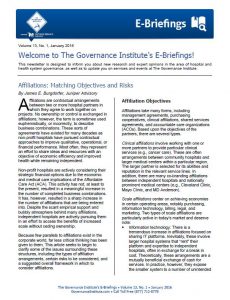Affiliations: Matching Objectives and Risks
 Affiliations are contractual arrangements between two or more hospital partners in which they agree to work together on projects. No ownership or control is exchanged in affiliations; however, the term is sometimes used euphemistically, or incorrectly, to describe business combinations. These sorts of agreements have existed for many decades as non-profit hospitals have pursued contractual approaches to improve qualitative, operational, or financial performance. Most often, they represent an effort to share ideas and resources with an objective of economic efficiency and improved health while remaining independent.
Affiliations are contractual arrangements between two or more hospital partners in which they agree to work together on projects. No ownership or control is exchanged in affiliations; however, the term is sometimes used euphemistically, or incorrectly, to describe business combinations. These sorts of agreements have existed for many decades as non-profit hospitals have pursued contractual approaches to improve qualitative, operational, or financial performance. Most often, they represent an effort to share ideas and resources with an objective of economic efficiency and improved health while remaining independent.
Non-profit hospitals are actively considering their strategic financial options due to the economic and medical care implications of the Affordable Care Act (ACA). This activity has not, at least to the present, resulted in a meaningful increase in the number of completed business combinations. It has, however, resulted in a sharp increase in the number of affiliations that are being entered into. Despite the scant empirical support and bubbly atmosphere behind many affiliations, independent hospitals are actively pursuing them in an effort to access the benefits of increased scale without ceding ownership.
Because few parallels to affiliations exist in the corporate world, far less critical thinking has been given to them. This article seeks to begin to clarify some of the issues surrounding these structures, including the types of affiliation arrangements, certain risks to be considered, and a suggested overall framework in which to consider affiliations.